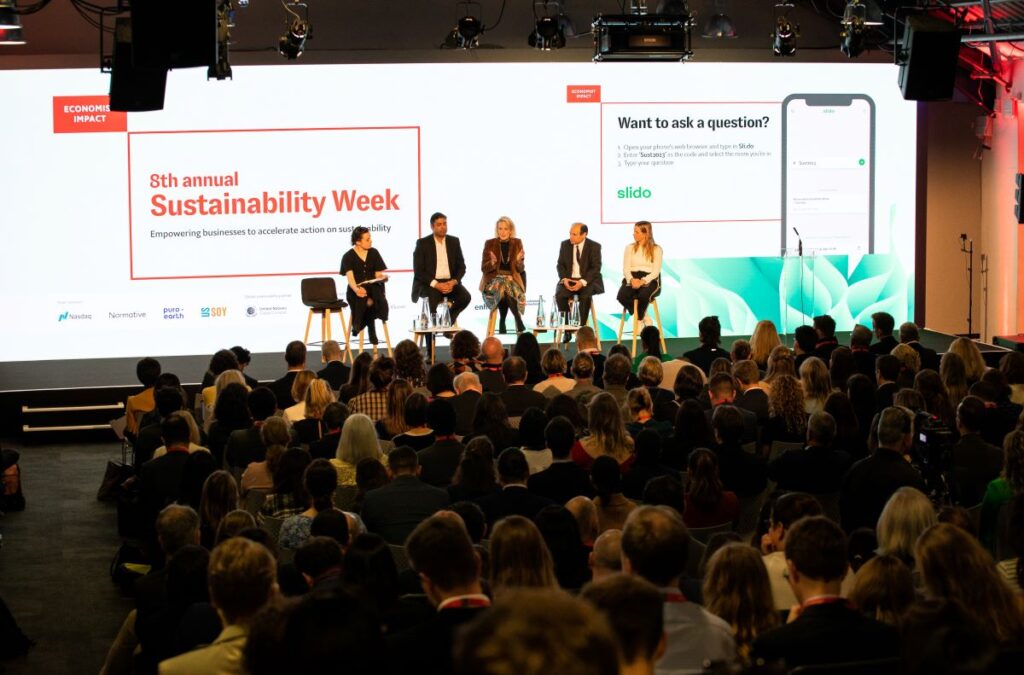Earlier this spring, Economist Impact’s eighth annual Sustainability Week brought together thousands online and in London to discuss strategies for empowering businesses to accelerate action on sustainability.
The event came on the heels of a new report from the UN Intergovernmental Panel on Climate Change (IPCC) that warns the world is unlikely to keep global warming to 1.5°C, but we still have feasible options to secure a sustainable future.
“As the IPCC’s recent report reminded us, we are all in it together,” said Dassault Systèmes Chief Sustainability Officer Philippine de T’Serclaes. “It’s a global issue that we are facing and we will only resolve it in time if we go about it together.”
And that was precisely the topic of “In this together – competition and collaboration on the path to net zero,” a panel that de T’Serclaes joined to discuss an array of topics ranging from public-private and cross-industry partnerships to creating new standards for measuring the impact of our actions. Also participating on the panel were Hannah Mills, sustainability ambassador for SailGP Global, Michael Greenfell, executive director of enforcement for Competition and Markets Authority (CMA), and Ambeshwar Nath, SVP and head of EMEA for Infosys.
Here are a few highlights from de T’Serclaes’ responses:
On partnerships
Asked about partnership examples, de T’Serclaes noted Dassault Systèmes is a founding member of the European Green Digital Coalition and supports 300,000 customers with software solutions that help address sustainability challenges.
At a time when there’s growing recognition of the importance of data orchestration and organization to meeting sustainability goals, Dassault Systèmes software empowers organizations to gather, organize and evaluate their data to make informed decisions. Another example is utilizing the software to run simulations and use the tools to reduce the weight of products during the design stages.

On whether governments should require innovation:
Citing the IPCC report calling for collaboration, de T’Serclaes advocated for a “sandwich approach” in which the pressure pushing toward sustainable innovation comes from both the top down and the bottom up. Recent evolutions of the European Union Taxonomy regulations applies top-down pressure to meet European Green Deal objectives. Meanwhile, allowing space for feedback from businesses can help more regulatory frameworks forward at the right levels to accelerate the transition to a sustainable economy, de T’Serclaes said.
On measuring the impact of activities:
Collectively, de T’Serclaes said, the Science Based Targets Initiative (SBTi) and Corporate Sustainability Reporting Directive (CSRD) reflect a move toward much more reliable metrics to determine whether companies are serious about their road to sustainability or if they’re doing greenwashing.
Our commitments to the Science Based Targets Initiative (SBTi) include having a 35% reduction of scope 1 and 2 by 2027 and a 24% reduction on scope 4 business travels during the same period; there’s also a commitment to have 50% of our own suppliers to have SBTi targets of their own by 2025. De T’Serclaes described CSRD, which effect in January 2023, as applying a very rigorous financial-type audit to non-financial reporting.
“At Dassault Systèmes, a science-based company, we measure and track what we do when facing a problem,” de T’Serclaes said. “I am confident that we are going towards reliable metrics with our sustainability commitment to SBTi and the newly coming CSRD.”
Read more about Dassault Systemes’ sustainability commitments.

